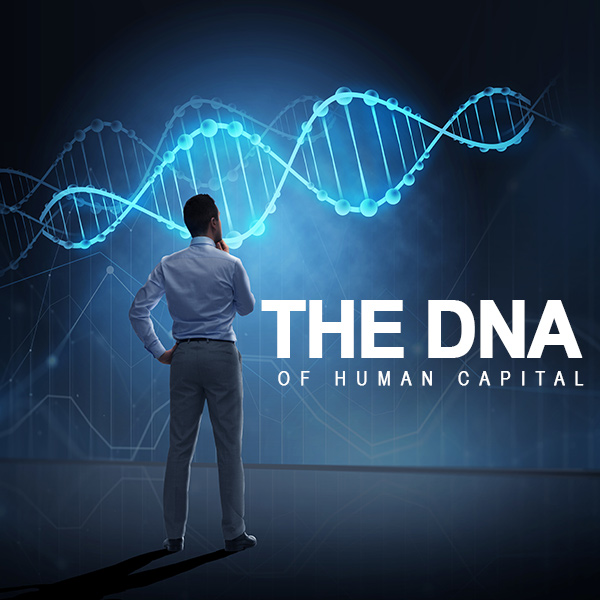 The HR Research Institute and HR.com recently released a new report entitled “The DNA of Human Capital: Trends Report 2019.” The report breaks down 12 critical traits crucial to the human capital of an organization.
The HR Research Institute and HR.com recently released a new report entitled “The DNA of Human Capital: Trends Report 2019.” The report breaks down 12 critical traits crucial to the human capital of an organization.
The 12 most critical traits for human capital are:
The Nouveau Workforce - Smart technologies and analytics are quickly becoming essential. Over three-quarters of HR professionals (78%) indicate that analytical thinking will be the most vital worker capability by 2020. And alarmingly, only 11% of organizations report they are making good progress building a capable workforce to meet 2020 goals.
Leadership - A well-designed leadership strategy combining diversity, good coaching, and data-driven decisions is imperative for effective future leadership. Only 20% of HR professionals give a high rating (at least 8 out of 10) to their organizations’ leadership skills, and only 17% of HR professionals agree (high/very high extent) that their leaders are effective coaches.
Learning and Development - Employee development programs are viewed as one of the most crucial HR issues, yet only a third of HR professionals feel that learning is embedded in their culture. Moreover, organizations are making slow progress in key areas such as personalization, mobile learning, and micro-learning.
Performance Management - Performance management is in need of serious reform. Management training is inadequate in this area. Just 21% of HR professionals believe (agree/strongly agree) that managers are skilled at performance management. Technologies are also being reformed. In 2019, performance management systems will be among the HR systems most likely to be added, replaced, or modified.
Talent Analytics - Leveraging talent analytics requires new skills, solid technology and, more than anything else, a new mindset. Currently, a majority (59%) of HR professionals do not make use of talent analytics, even though organizations that excel at it report support from management and a noticeable competitive advantage.
Talent Acquisition - “Recruiting talent to support growth” is the most important area of focus for HR departments in 2019, tied with “employee learning and development.” Yet, many companies are failing in this crucial area. In fact, HR professionals regret an average of 31% of new hires.
Diversity and Inclusion - Most organizations have not yet reached a higher maturity level when it comes to diversity and inclusion (D&I) practices. Companies with successful D&I initiatives are more likely to have support from senior leaders, to track metrics in this area, and to require D&I training for their workforce.
Human Engagement - Engagement deficits are costing employers a fortune. Continuously measuring and tracking engagement is key, but success requires action based on those metrics. More than anything else, leadership (77%) and culture (74%) are essential for supporting initiatives and driving employee engagement.
HR and Workforce Technologies - How companies leverage artificial intelligence (AI) and smart technology will be integral to their performance. Only 10% of companies report making high or very high use of AI for HR, so there’s a long way to go to leverage the benefits of the AI technology.
The HR Function - HR must prepare for the future by adopting more strategic responsibilities and by acquiring greater knowledge of technologies and analytics. It must close the skills gaps in its own profession.
Workforce Planning - Turning mounds of data into real insights and recommended courses of action will be a challenge but also a necessity. Companies must devote more resources to career planning and succession planning to ensure workforces have the up-to-date skill sets needed to keep their business moving forward.
The Human Experience - Human experience (HX) goes beyond the employee experience when a company can create meaning for their employees at work. Employees want to reach their full potential, and HR can take the lead on helping employees set and attain goals to maximize employee engagement levels.
“HR could be the single most important profession of the next decade. The future will be powered by talent. But, to reach its potential, HR must quickly develop the skills it needs to succeed, such as improved leadership, analytical knowledge, strategic thinking and more,” stated Debbie McGrath, chief instigator and CEO of HR.com.
Additional ASE Resources
As ASE’s mission states, “ASE’s mission is to support employers by providing a broad range of information, services, and training that enables them to successfully manage their most important asset: their people.” We can help you address many of the issues brought to light above with the following services:
Leadership Training – ASE offers many solutions for developing your leadership team. From our Principles and Practices of Supervision course to one on one coaching to The Leadership Academy, we have a solution to fit your needs. For more information on any of these services please contact Anthony Kaylin.
Talent Acquisition – If you need help recruiting direct-hire or supplemental staff, ASE can help. We serve many fields beyond HR, including supply chain management. ASE members receive a 10% direct-hire placement fee. We can help you increase your talent pool. For more information, contact Keisha Ward.
Assessments – ASE is a resource for employment tests that can help identify transferable skills. If your organization is considering testing candidates for employment or promotion, ASE provides testing tools, information, and consultation. For more information, please contact Michael Burns.
Employee Engagement - ASE offers many tools for measuring employee engagement and the employee experience. High engagement can be a strong indicator that employees are finding their work meaningful. For more information on these tools, please contact Linda Olejniczak.
Workforce Planning – ASE works with several experienced partners to help organizations create an effective succession plan for key positions. For more information, please contact Michael Burns.
Source: HR.com